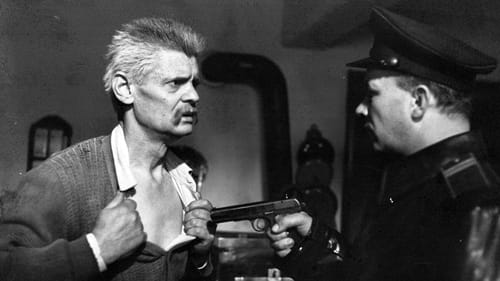Géza Tordy
出生 : 1938-05-01, Budapest, Hungary

Károlyi tábornok
Historical movie on the life of András Hadik

Karcsi, a Roma policeman, lives with Eva, a Swede. One day he is called to the scene of the murder of a wealthy trafficker named Schulter. He begins to investigate the crime, interrogate neighbours and suspects, and untangle a complex situation - one that he, himself, complicates even further. For he is a gypsy, who despite being adopted and raised by "regular" Hungarians, has his nose rubbed in his minority status every day. The film, which is based on the novel by Ákos Kertész, is a shrewd genre work full of dusky humour and surreal situations. Tabló follows a vivid succession of strange images that eventually lead to the emergence of the central story about a charismatic police officer on a tireless quest for the truth, though he must fight against virtually everyone and is just as fallible as the next person. Tabló makes a statement on the issue of race and racism - or, indeed, relations between any minority and majority.

Voice
Divided into four sections, "Song" is inspired by the Siberian and Finno-Ugric legends about Creation, in which the world begins with characters who are only half-human, one being half-bird, the other half-bear. The narrator delves into the origins of Hungarian culture, the Iranian and Turkish influences that impacted the society, and finally the story of Stephen, the emperor who brought Christianity to the country and shifted the capital west in an attempt to link with Europe.

Apafi Mihály, Erdély fejedelme

1866. The Habsburg monarchy fight a war against the Italians and the Prussians. General Klapka, who emigrated to England after the fall of the 1848-49 freedom fight of Hungary, exploits the situation and organises a Hungarian legion with the help of the Prussians, then attacking the Austrians in their back sets out to return to Hungary.

Apa

1852. Gáspár Noszlopy escapes from prison in order to capture the emperor, who is to visit Hungary, with his companions and force him to sign the Declaration of Independence. He is only able to find four fanatic men, as his one-time soldiers have already accepted the established order as unalterable, each of them having found a satisfactory way of life and unwilling to undertake a suicidal experiment.

The satiric film is a dramatic-ironic picture of the Hungarian intellectuals in the seventies. Ebes, whose art has been awarded for its merits conglomerating folk features with modernity, can hardly believe that from his parents, old friends, and the sons of the people he did not even receive a telegram of congratulation.

Gustaf Roné

Sziráki

Konrád, a francia

Riporter
Eve, the old professor zsongják beautiful wife surrounded by colleagues. When the professor's going away for a conference abroad, intensifying the suitors attempts. Eve, however faithful to her husband, so that the denials are increasing. Oddly enough, the rejected accidents ...

Baradlay Jenő
Based on the novel of Mór Jókai. During the Hungarian independence war 1848-49 mother and her three sons trying to leave the road precisely designated by their conservative, stone-hearted father. The way-seeking and rivalry of brothers, Jókai's masterpiece, the cast, delightful scenes give an unforgettable experience.

Pali
A crusading newspaper reporter covers the Soviet invasion of Hungary in 1956. Initially critical of the communists, the feature later espouses the virtues of the social changes implemented since the invasion. The title refers to the period of time the reporter spent interviewing witnesses to the invasion.

Szabó Laci
The grey hero of grey workdays, the divorced cashier of a cinema who is always willing to sacrifice herself for others, Etelka, is awarded a two-week-holiday at Lake Balaton. Following the advice of her female friend, she tries to live life at full speed.

Rikkancs
During World War I, an ancient feud divides the industrial area in the county of Nógrád. The workers of the steal factory start a strike, but the miners do not support their cause. Sanyi from the steal factory and Ilonka from the mining community fall in love with each other, but can only meet secretly. When the boy dances with the girl in the pub of the miners, he is recognised and knocked down.

Attila Szabó
Vetró János, the lorry driver, is an alcoholic. His marriage is in pieces, his wife has a lover. Their son suffers an accident. The next day his wife moves out. In his desperation, Vetró drinks even more, and leaves his work as well.

December 1956. The region by the Tisza is evacuated because of a threatening flooding. Laci, Karcsi and Péter leave their home on the lorry

Lali Kárász
Daddy Kárász, the stakhanovist worker, complains in a television interview about the fact that his family, consisting of many members, cannot get a home on their own. Kéri, the chairman of the local authority, promises to help him on the condition that if he does not, they may move in to his villa at elegant Pasarét. Nothing happens, therefore the Kárász family takes Kéri by his word. From this time on, tumultuous scenes and frequent quarrels take place in the villa between the two families.

Following his wedding, Feri left the co-operative and is now working on the land of his father-in-law. Tóth is extremely wilful and thrifty, working from early morning to late night, pushing his family as well.

1922. Sándor serves as a farm-hand, but would like to become a blacksmith. He is completely enchanted by the beautiful wife of his new master.

Karesz
The "sleepless years" in this propaganda piece by director Felix Marlassy occur on Csepel Island, an island south of Budapest that is home to an armaments factory. The factory workers are shown being exploited by imperialists, capitalists gone berserk, and fascists, more or less in that exact chronological sequence. The heavy-handed approach does much to undercut the belief that when socialism finally takes over, the lives of the workers are brought up to a human level. In this instance, audiences might prefer a more nuanced and subtle statement, no matter what the message.

Feri
In 1944, Feri Margittai escapes from the front, but his mother sends him away from home.

The film, depicting life in the tenement houses of Angyalföld in the thirties joins the neorealist currents of Hungarian film. Ambrus Pista, the good humoured, attractive tram conductor is loved by women for his excellent job as well. With his lover, the street-walker Terus they spy upon the neighbour as he beats his wife in jealousy.
















